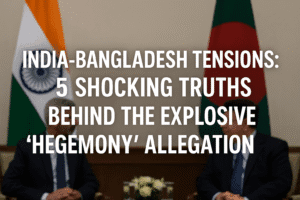India-Bangladesh Tensions: 5 Shocking Truths Behind the Explosive “Hegemony” Allegation
India’s Foreign Ministry has dismissed allegations from Bangladesh’s interim leadership that Indian “hegemony” is causing a national crisis, calling it a diversion from Dhaka’s domestic governance challenges. The remarks follow reports that Chief Adviser Muhammad Yunus privately blamed India for conspiring against Bangladesh. New Delhi firmly rejected these claims, suggesting they deflect from internal issues while still emphasizing its commitment to partnership.
Meanwhile, India raised concerns about paused US student visa processing affecting Indian applicants. Separately, the MEA clarified that the recent India-Pakistan ceasefire (“Operation Sindoor”) resulted solely from direct military talks, denying any US mediation role or discussions involving trade incentives. This reflects India’s assertive stance in countering narratives about its regional role while navigating complex diplomatic relationships. The exchange underscores ongoing sensitivities in India-Bangladesh relations during Dhaka’s transitional period.

India-Bangladesh Tensions: 5 Shocking Truths Behind the Explosive “Hegemony” Allegation
The diplomatic waters between New Delhi and Dhaka churned this week as India sharply rebutted allegations of “hegemony” emanating from Bangladesh’s interim leadership, framing the accusations as a diversion from pressing domestic challenges. Here’s a deeper look at the friction and its context:
The Core Dispute:
- Bangladesh’s Allegation: Chief Adviser Muhammad Yunus reportedly told a political leader (Mahmudur Rahman Manna) that Bangladesh faces a “deep crisis” due to a “conspiracy of Indian hegemony,” suggesting India actively seeks to undermine Bangladesh and could “destroy us in a single day.”
- India’s Rebuttal: MEA Spokesperson Randhir Jaiswal dismissed the claims, stating they appear designed to “deflect internal governance challenges in another direction.” He emphasized that blaming external actors won’t solve Bangladesh’s problems, implicitly placing responsibility for domestic issues squarely on the interim government in Dhaka. Crucially, Jaiswal reiterated India’s commitment to a partnership with Bangladesh.
Reading Between the Lines:
- Deflection Tactics: India’s response highlights a common political strategy – shifting focus from internal difficulties (economic pressures, political uncertainty under the caretaker government, social issues) by invoking an external threat. This framing resonates with certain domestic audiences in Bangladesh.
- Sensitivity of “Hegemony”: The term “Indian hegemony” carries deep historical and political weight in South Asia. Its use by a figure like Yunus, even if reported second-hand, taps into long-standing anxieties in some Bangladeshi circles about perceived Indian dominance in economic, political, or security spheres. India is acutely sensitive to this characterization.
- Interim Government Context: The remarks emerge under Bangladesh’s non-partisan caretaker administration. This raises questions about the source and intent of such a provocative statement – is it a genuine expression of concern, a political maneuver by associated figures, or an attempt to shape the narrative ahead of future elections?
- The Partnership Paradox: Despite the sharp rhetoric, both sides officially maintain a desire for partnership. This underscores the complex reality: deep economic ties, shared security concerns, and people-to-people links coexist with underlying suspicions and political friction.
Broader Implications & Other Key Points:
- US Student Visa Pause: The MEA expressed hope that Indian student visa applications to the US would be processed on merit despite a global pause in new interview scheduling by the Trump administration, highlighting the priority India places on educational access.
- India-US Strategic Talks: Foreign Secretary Vikram Misri’s US visit focused on strengthening ties in trade, critical tech, and defense, alongside key initiatives like the Quad and I2U2. This signifies continued robust engagement despite other diplomatic frictions.
- Clarifying “Operation Sindoor” & the Ceasefire: The MEA firmly rejected US claims of brokering the recent India-Pakistan ceasefire (“Operation Sindoor”) with trade incentives. Jaiswal reiterated:
- Ceasefire discussions were strictly bilateral (between Indian and Pakistani military directors).
- Trade/tariffs were never part of these discussions.
- Future talks, if any, remain solely between India and Pakistan, dismissing external suggestions of broader negotiations involving Kashmir.
Why This Matters Beyond the Headlines:
This episode is more than just a war of words. It reveals:
- The Fragility of Trust: Even strong regional relationships like India-Bangladesh are vulnerable to miscommunication and the politicization of grievances.
- Domestic Pressures Shape Diplomacy: Internal political dynamics within Bangladesh significantly influence its external posture, sometimes leading to rhetoric that strains ties.
- The Enduring “Hegemony” Narrative: India’s size and influence inevitably lead to perceptions it must constantly manage, requiring proactive diplomacy and sensitivity to neighbors’ concerns.
- India’s Assertive Diplomatic Stance: New Delhi is increasingly willing to publicly counter narratives it deems false or damaging, whether from neighbors (Bangladesh, Pakistan) or major partners (US claims on ceasefire).
The path forward for India-Bangladesh relations hinges on navigating these underlying tensions. While economic and strategic cooperation remains vital, addressing the persistent narratives of dominance and ensuring respectful dialogue, especially during Bangladesh’s transitional phase, will be crucial for lasting stability in the region. The ball is now in both courts to move beyond deflection and accusation towards constructive engagement.
You must be logged in to post a comment.